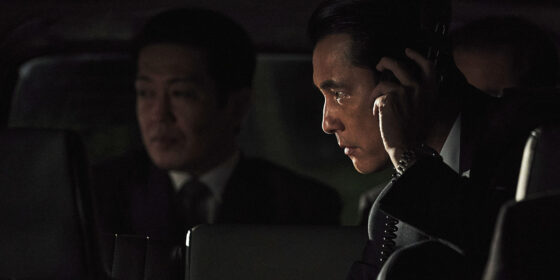TIFF 2022 | Hunt (Lee Jung-jae, South Korea) — Galas 

By Michael Sicinski
If I may be permitted a rather clichéd observation, a good procedural is like a game of chess. Complex machinations are involved, and many strategies require foresight, the ability to think several moves ahead. Hunt, the directorial debut of Squid Game star Lee Jung-jae, takes a very different approach: what if you tried to outsmart your opponent by simply throwing more and more pieces on the board, creating utter chaos and a complete inability to even see the board? It’s possible that some ambitious formalists might take it upon themselves to parse and diagram the narrative of Hunt, proving that everything we see not only makes sense but is utterly necessary. But this is well beyond my ken: all I see are dark suits, guns, and a two-hour-plus runtime that hurtles along as if by jet propulsion.
It’s possible that Lee is counting on the domestic audience’s familiarity with certain of the film’s background elements—particularly the 1979 assassination of President Park Chung-hee by the then-director of the KCIA—but I’m not sure that an awareness of this political context necessarily makes Hunt more intelligible. At the film’s heart is a showdown between two highly placed operatives in the Korean intelligence bureau, the ANSP: Park Pyong-yo (Lee), the head of the Foreign unit; and Kim Jung-do (Jung Woo-sung), his opposite number in the Domestic unit. Following the botched extraction of a North Korean nuclear scientist who was trying to defect, it becomes clear there’s a mole in the bureau, and before long the two branches of the ANSP, and their respective leaders, are investigating one another, going deeper and deeper down the rabbit hole of espionage.
So far, this probably sounds like a fairly straightforward riff on the Infernal Affairs trilogy. But Lee shifts back and forth in time, touching on the Gwangju massacre, personal scandals involving friends of the president, backhanded dealings with a defense contractor, a smug North Korean pilot who flies his fighter jet right into the Seoul airport, a promise to a fallen comrade, the suppression of the pro-democracy movement, and a couple of assassination plots that intersect almost by accident. It’s probably not a good sign that I kept thinking about the directors who would’ve navigated this material better: Bong Joon-ho, Johnnie To, or even Lee Myung-se.
Despite making very little sense, Hunt is never less than diverting; after all, no one ever got bored inside a tornado. A generous interpretation might suggest that Lee is actively courting incomprehensibility, hoping to make the rampant paranoia of the dictatorship years something the viewer feels rather than understands. (This is what we call the Khrustalyov Defense.) But it’s hard to get behind this reading, since the overall tone of Hunt implies that the various fragments ought to be forming some larger gestalt. A more likely explanation is that television’s current dominance is having a strange effect on feature filmmaking. Instead of telling a more streamlined story, Lee tries to cram a season’s worth of twists and turns into 130 minutes. Perhaps helpful recaps—“last reel on Hunt….”—can be inserted in a fan edit.
Michael Sicinski

